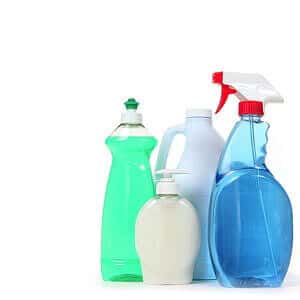
For decades, Americans embraced antibacterial products. They sought out hand sanitizers, soaps, kitchen cleansers, toothpastes and cosmetics with an ingredient called triclosan. Toys, clothing and kitchen products also contained this compound.
Going Sour on Antibacterial Chemicals:
Then researchers began warning that triclosan could be an endocrine disruptor. In other words, it might affect hormone function in the body. Last April the FDA banned the chemical’s use in hand sanitizers, but triclosan can still be found in some toothpastes, antibacterial soaps and deodorants.
Now, scientists report an association between triclosan exposure and osteoporosis. They tracked triclosan in the urine of more than 1,800 women between 2005 and 2010 (The Journal of Clinical Endocrinology & Metabolism, June 25, 2019). Women with the highest levels of urinary triclosan had the lowest bone mineral density, on average. In postmenopausal women, high triclosan levels were also associated with the risk of osteoporosis. The investigators measured bone mineral density of the femur (thigh bone), lumbar (lower) spine and the top of the thigh bone just below the hip socket.
Exposure to Triclosan:
Almost a decade ago, we received this question, as concerns about triclosan and other antibacterial compounds were just coming to light.
Q. Should I be concerned about the dangers of triclosan found in liquid soap, toothpaste and my lipstick? One of the members of our Special Needs Children group brought in an article about it. Many of us were shocked.
We all admitted to going through gallons of antibacterial hand soap in a year. I wash my hands with it at least 25 or 30 times a day and have for years. What can you tell us about this chemical?
Questions About Triclosan:
A. Given how widespread triclosan is, we can’t tell you enough. This antibacterial ingredient is found in cleaning supplies, deodorants, liquid soaps, toothpaste, shaving cream and mouthwash. Research in rodents and many species of aquatic animals demonstrates that triclosan disrupts hormones and may cause developmental changes. Some researchers have found that exposing mice and frogs to triclosan may increase their chances of developing thyroid problems.
In addition, others have demonstrated that triclosan found in municipal waste can affect thyroid hormones (Toxicology in Vitro, April 2018). Nonetheless, many scientists have been skeptical that triclosan disrupts hormones in humans (Critical Reviews in Toxicology, April 2017).
Antibiotic Resistance:
The Environmental Working Group, a nonprofit organization, has summarized information about triclosan toxicity on its Web site (www.ewg.org). Triclosan from personal care products contaminates streams and rivers. Moreover, it clearly enters our bloodstreams if it shows up in urine. On the other hand, triclosan dramatically increases antibiotic resistance in bacteria (Antimicrobial Agents and Chemotherapy, May 2019). This effect is just as worrisome as its endocrine-disrupting potential.
Use Plain Soap:
Washing with ordinary soap and water works just as well as washing with antibacterial soap, according to researchers at the University of Michigan School of Public Health. If you need a hand sanitizer, a thymol-based spray such as CleanWell or an alcohol-based product such as Purell should pose no risk.
Citations
- Cai S et al, "Association between urinary triclosan with bone mass density and osteoporosis in the US adult women, 2005-2010." Journal of Clinical Endocrinology & Metabolism, June 25, 2019. https://doi.org/10.1210/jc.2019-00576
- Mihaich E et al, "Hypothesis-driven weight-of-evidence analysis of endocrine disruption potential: a case study with triclosan." Critical Reviews in Toxicology, April 2017. DOI: 10.1080/10408444.2016.1269722
- Cavanaugh JE et al, "Assessment of endocrine disruption and oxidative potential of bisphenol-A, triclosan, nonylphenol, diethylhexyl phthalate, galaxolide, and carbamazepine, common contaminants of municipal biosolids." Toxicology in Vitro, April 2018. DOI: 10.1016/j.tiv.2018.02.003
- Westfall C et al, "The widely used antimicrobial triclosan induces high levels of antibiotic tolerance in vitro and reduces antibiotic efficacy up to 100-fold in vivo." Antimicrobial Agents and Chemotherapy, May 2019. DOI: 10.1128/AAC.02312-18

